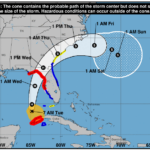More than 30 investors have called on proxy advisor ISS to improve the guidance it gives to clients wanting companies to decarbonize faster, saying its policies had failed to keep pace with rising climate change risks.
Institutional Shareholder Services (ISS) is highly influential as it provides advice on how to vote at corporate annual meetings on everything from boardroom diversity to corporate efforts to get to net-zero carbon emissions.
The Institutional Investors Group on Climate Change (IIGCC) and 36 investors including UBS Asset Management (UK), AXA Investment Managers and Swedish pension fund AP3 this week wrote to ISS’ Global Head of Research, Georgina Marshall.
In the letter seen by Reuters, the group of mostly European asset managers said they wanted a “specialty net-zero policy” for the 2024 proxy season that fully integrates net-zero benchmarks into the policy and voting recommendations.
They also want more robust climate proxy voting recommendations in ISS’ core and widely used ‘Benchmark Policy’, which the group said acts as a baseline for many investors.
Edward Mason, director of Engagement, Generation Investment Management and Chair of IIGCC’s Proxy Advisor Working Group, told Reuters there was “frustration about the pace of change” at ISS after two years of engagement and growing pressure from ISS’ own clients for it to take climate risks more seriously.
“Emissions are not going down, companies are not doing enough. We don’t have time for gentle, incremental change,” he said. “It’s just critical that proxy advisors incorporate these [climate] norms into their proxy advice.”
A spokesperson for ISS said they had received the letter on Wednesday and would review its contents in due course along with other “client and market feedback we receive as part of our structured annual policy development process.”
As part of the Benchmark Policy overhaul, the investors called on ISS to accelerate progress in four areas: board accountability, company transition plans, the treatment of shareholder resolutions and its alignment with the Climate Action 100+ Net-Zero Company Benchmark, where investors grade companies on their net-zero performance.
On the issue of board accountability, for example, “soft criteria” had meant ISS did not recommend voting against a single director at the biggest emitters on climate grounds last year, Mason said.
The letter marked an “escalation” in IIGCC’s efforts to get ISS to move faster, Mason said. He said the signatories were bigger users of ISS services than other proxy advisors, but IIGCC would continue to pressure them to move faster too.
U.S. proxy advisers ISS and Glass Lewis, however, face competing pressures.
In January they were forced to defend their voting recommendations on environmental and social matters after U.S. Republican attorneys general questioned whether their guidance violated their duties to clients.
(Reporting by Tommy Reggiori Wilkes and Simon Jessop; editing by Josie Kao)
Was this article valuable?
Here are more articles you may enjoy.



 Warren Buffett’s Bet on Mild Florida Storm Season Faces Test With Hurricane Idalia
Warren Buffett’s Bet on Mild Florida Storm Season Faces Test With Hurricane Idalia  US Corn Harvest Is in Trouble
US Corn Harvest Is in Trouble  Citizens Suspends Binding, Could Be Most Affected as Hurricane Aims for Big Bend
Citizens Suspends Binding, Could Be Most Affected as Hurricane Aims for Big Bend  3M Agrees to Pay More Than $5.5 Billion Over Military Earplugs
3M Agrees to Pay More Than $5.5 Billion Over Military Earplugs 

